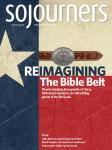WHEN YOU GIVE a luncheon, Jesus says, don’t invite your rich neighbors; instead invite the poor, the vulnerable, the outcast. I was reminded of Jesus’ words recently when President Obama came to Boston. Local foodies celebrated his stop at a hip restaurant. However, only the “rich neighbors” were invited: Thirty guests who had paid up to $33,400 each in political contributions were given the opportunity to lunch with the president.
Amazingly, a $33,000 lunch is pocket change for those now entitled, thanks to Citizens United, to the ears of our politicians. In the 2012 election, one multibillionaire spent $150 million to defeat Obama. Thirty-two super PAC donors, “giving an average of $9.9 million each, matched the $313 million that President Obama and Mitt Romney raised from all of their small donors combined—that’s at least 3.7 million people giving less than $200,” stated a 2013 report that examined Federal Elections Commission data.
In 2010, the Supreme Court concluded that corporations are “people” with First Amendment rights to free speech, opening the floodgates for unaccountable money to pour into state and federal elections. In essence, the Citizens United ruling put democracy up for sale. In the “marketplace” of political representation, almost all Americans are outbid and locked out.
Now millions of Americans are working for a constitutional amendment to overturn Citizens United—and they’re gaining traction.
The Democracy for All amendment states: “Congress and the States may regulate and set reasonable limits on the raising and spending of money by candidates and others to influence elections.” The amendment allows for reasonable limits on campaign spending and other overdue reforms, including reinstating the restrictions on corporate election spending that were struck down under Citizens United. Currently, it has 39 co-sponsors in the Senate and 126 co-sponsors in the House.
All Americans have a stake in this struggle, but when human dignity and equality are jeopardized, people of faith must lead. Last year, 18 national faith organizations urged Congress to advance a campaign-finance-reform amendment. Methodists, Presbyterians, Muslims, Quakers, Mennonites, members of the Disciples of Christ, United Church of Christ, and several Catholic organizations and religious orders are demanding that “a democratic country should actually adhere to democratic practices.” As Jim Wallis, editor-in-chief of Sojourners, put it, “There certainly isn’t, and never will be, a super PAC for the poor.”
Other religious groups are offering resources as well. Auburn Theological Seminary’s report Lo$ing Faith in Our Democracy is a multifaith deep-dive into the theological underpinnings for challenging the radically unequal role of money in politics. The Franciscan Action Network launched Faithful Democracy, a campaign to examine the influence of PAC money on issues such as private prisons, climate change, gun-violence prevention, and immigration.
Local and state initiatives to overturn Citizens United are also building momentum. In Montana, for example, voters charged their congressional delegation to ensure “a level playing field in campaign spending.” More than 20 faith leaders rallied support for the ballot initiative. “People, not corporations and special interests, are made in the image of God,” wrote Lutheran Bishop Jessica Crist. “This is a faith issue. ... This is not a partisan issue, [but] a justice issue.” Montana voters passed the constitutional amendment ballot initiative by a margin of 3 to 1.
In just five years, vibrant leadership from faith communities has shifted the constitutional amendment movement from a pipe dream to the mainstream. Sixteen states and 660 communities have enacted amendment resolutions, often by overwhelming cross-partisan margins. Now the movement is entering the presidential race: Both Democrat Hillary Clinton and Republican Lindsey Graham are calling for an amendment to overturn Citizens United.
Meaningful checks and balances must be re-established to clean up the corruption in our political system and to shape corporations in ways that better serve our democracy. A constitutional amendment could overturn the excesses unleashed by Citizens United and help lead to a more-representative democracy. When we do that, all will be welcome at the celebration luncheon.

Got something to say about what you're reading? We value your feedback!
